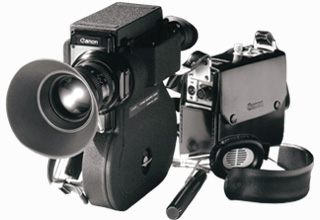16mm Movie Camera
SOUND SCOOPIC 200S / 200SE![]()
SOUND SCOOPIC 200S / 200SE![]()
SOUND SCOOPIC 200S / 200SE![]()
 Japan
Japan Americas
Americas Europe, Asia, Oceania
Europe, Asia, Oceania
- Outline
- Specifications
| Marketed | September 1972 |
| Original Price | 2,550,000 yen |
The Sound Scoopic 100 and the Sound Scoopic 200 that were released in 1970 were well accepted by the market as movie cameras with the high capacity 6:1 zoom lenses. But there were calls for a camera with a lens of greater light gathering capability.
The answer to these calls was the Sound Scoopic 200S with a brighter, new lens (17 elements in 13 groups) and F-stops in the range 2.5 to 1.8. The upgrade was achieved by widening the shutter open angle from 135 to 170 degrees. The Sound Scoopic 200SE was also developed with TV image frame lines added inside the viewfinder.
| Type | 16mm movie camera with simultaneous sound recording (single system) | |
| Image Size | 10.26 x 7.49 mm | |
| Film | 61m (200 ft.) of 16 mm single perforated, magnetic coated film | |
| Lens | Focal Length/Speed | 12.5 to 75 mm t/2.4(f/1.8) (17 elements in 13 groups including 5 new type glass element) |
| Zooming Ratio | 6:1 | |
| Focusing | Manual(Front-element focusing) 1.1m to infinity | |
| Zooming | Manual (lever attached) | |
| Filter | Gelatin filter inserted into the photo lens path | |
| Front Thread Diameter | 72 mm | |
| Viewfinder | Type | Single-lens reflex using mirror shutter (eyepiece rotates) |
| Rangefinder | None (focusing done with overall matte focusing glass) | |
| Dioptric Adjustment | -4 to +2 diopter adjustment (eyesight fixture ring attached) | |
| Information | Aperture value, metering needle, over/under exposure warning marks,manual aperture mark | |
| Eyepiece Shutter | Built-in | |
| Exposure Control | Type | TTL method, completely automatic Electric Eye system (automatic correction with a gelatin filters) that employs a light-sensitive CdS photo cell and servo circuit with response time approx. 1 sec. in the range t/2.4 to t/32 |
| Metering Range | ISO 640 t/4 24 fps. to ISO 20 t/32 24 fps. | |
| Film Speed | ISO 20 to 640 (1/3-stop increments) | |
| Aperture Adjustment | Manual ring adjustment possible from t/2.4 to t/32 | |
| Aperture Opening Button | Focus adjustment with aperture opening button | |
| Film Drive | Type | Electromotive film feed by a built-in mini-servomotor controlled by electronic governor (used jointly with registration pin), manual feed knob provided |
| Film Loading | 2-method side loading, with sound or silent | |
| Filming Speed | 24 fps. | |
| Image Stability | Within 01.5% vertically, within 0.1% horizontally | |
| Power Source | Provided in the sound recorder amplifier | |
| Battery Life | 15 rolls at 200-ft each (normal temperature), 1 roll at 200-ft. each at –20°C. | |
| Footage Counter | Footage count with a 10-ft. scale, automatically returns to “S” every time side cover is opened | |
| Battery Checker | Button press mini-meter display on the sound recorder amplifier | |
| Shutter | Shutter Opening | 170 degrees |
| Mirror Shake Button | Provided (to fine adjust the position of the mirror shutter) | |
| Sound Recording System | Method | Current bias magnetic sound recording system |
| Bias Waveform | 61 KHz | |
| Other | Distance between shooting aperture and recording head: 28 frames Recording head and playback head of the monitor can be removed together as one unit |
|
| Wow/Flutter | Within 0.25% (WRMS) | |
| Sockets | Amplifier connection point | |
| Grip | Fixed hand-grip with hand strap provided | |
| Tripod Socket | 2 types: CU1/4, CU3/8 | |
| Working Temperature Range | -20°C to +50°C | |
| Dimensions (W x H x D) | 133 x 286 x 361 mm | |
| Weight | 5,700 g | |
| [ Sound Recorder Amplifier ] | ||
| Recording Waveform Characteristics | 200 to 8000 Hz -3 dB | |
| Recording S/N | 45 dB or more | |
| Distortion | Max. 3% | |
| Other Recording Characteristics | SMPTE Standard | |
| Recording Volume Adjustment | Automatic (AGC), manual adjustment possible | |
| Microphone | Single-direction (Sanken MU-2), input impedance: 600 ohm balance | |
| Monitor | Headphone impedance: 32 ohms | |
| Power Source | Hermetically sealed Ni-Cd battery 24V 1.5Ah (10 hour capacity) Recharge time: 5 hours at normal temperature Power supply for both camera drive and amplifier Amplifier and battery checker share same level meter |
|
| Dimensions (W x H x D) | 63 x 157 x 190 mm Power supply component: 59.5 x 89.5 x 183 mm |
|
| Weight | 3,000 g | |


